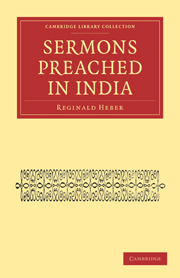Book contents
- Frontmatter
- PREFACE
- Contents
- THE VALEDICTORY ADDRESS
- A CHARGE
- SERMON I PREACHING OF ST. JOHN THE BAPTIST
- SERMON II OFFICE OF CHRIST
- SERMON III CHARACTER OF CHRIST AND HIS RELIGION
- SERMON IV CHRIST PREACHING TO SINNERS
- SERMON V THE LAW AND THE GOSPEL
- SERMON VI THE CHRISTIAN'S FAITH AND FEAR
- SERMON VII THE CHRISTIAN'S TREATMENT ON EARTH
- SERMON VIII THE PHARISEE AND THE PUBLICAN
- SERMON IX THE GOOD SAMARITAN
- SERMON X LABOURERS IN THE VINEYARD
- SERMON XI THE CONVERSION OF THE HEATHEN
- SERMON XII THE OMNIPRESENCE OF GOD
- SERMON XIII SIN AND GRACE
- SERMON XIV ON THE LOVE OF GOD
- SERMON XV CHRISTMAS DAY
- SERMON XVI NEW YEAR'S DAY
- SERMON XVII EASTER DAY
- ADDRESS ON CONFIRMATION
SERMON V - THE LAW AND THE GOSPEL
Published online by Cambridge University Press: 05 March 2012
- Frontmatter
- PREFACE
- Contents
- THE VALEDICTORY ADDRESS
- A CHARGE
- SERMON I PREACHING OF ST. JOHN THE BAPTIST
- SERMON II OFFICE OF CHRIST
- SERMON III CHARACTER OF CHRIST AND HIS RELIGION
- SERMON IV CHRIST PREACHING TO SINNERS
- SERMON V THE LAW AND THE GOSPEL
- SERMON VI THE CHRISTIAN'S FAITH AND FEAR
- SERMON VII THE CHRISTIAN'S TREATMENT ON EARTH
- SERMON VIII THE PHARISEE AND THE PUBLICAN
- SERMON IX THE GOOD SAMARITAN
- SERMON X LABOURERS IN THE VINEYARD
- SERMON XI THE CONVERSION OF THE HEATHEN
- SERMON XII THE OMNIPRESENCE OF GOD
- SERMON XIII SIN AND GRACE
- SERMON XIV ON THE LOVE OF GOD
- SERMON XV CHRISTMAS DAY
- SERMON XVI NEW YEAR'S DAY
- SERMON XVII EASTER DAY
- ADDRESS ON CONFIRMATION
Summary
Gal. iii. 19.
Wherefore then serveth the law? It was added because of transgressions, until the seed should come to whom the promise was made.
The main scope and purpose of St. Paul in his Epistle to the Galatians, has been by many men so greatly misunderstood, and so dangerously perverted to purposes entirely foreign to the apostle's intention, that we cannot too closely bear in mind that the dispute between them was, whether the law of Moses was of perpetual obligation or no, and whether the observance of its ceremonies and sacrifices was necessary to obtain pardon for the sins of mankind? The Galatians and the great body of Jewish Christians, supposed that circumcision, that the refraining from swine's flesh, that the wearing their beards long, and a blue fringe on their garments, were observances with which, as they had been once commanded by God, no man had power to dispense with; and that expiation and forgiveness of the sins of the world were to be sought for universally, through the means of the sacrifice ordained by Moses.
St. Paul, on the other hand, was taught by the Holy Ghost, that the laws of Moses were calculated only for a certain space of time and a particular race of mankind; that the distinctions which had formerly served to separate them from the Gentiles, became of no use whatsoever so soon as the Gentiles and the Jews were united in the bands of Christianity as “one fold” under “one Shepherd;” and that the sacrifices and ceremonies, which were only shadows of good things to come, became void and without obligation or effect when the One most pure Lamb of God had been offered for the sins of the world.
- Type
- Chapter
- Information
- Sermons Preached in India , pp. 92 - 103Publisher: Cambridge University PressPrint publication year: 2011First published in: 1829



